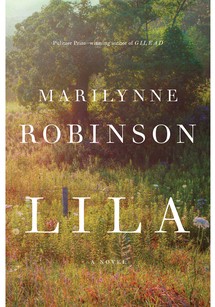Lila
By Marilynne Robinson
272 pages;
Farrar, Straus and Giroux
Marilynne Robinson's Lila (FSG) is an enthralling
meditation on belief, suffering and grace. The story of a woman raised
without a home, a family or God ultimately becomes a celebration of
what it means to be alive.
Robinson's
readers will recognize the title character and her husband, the Reverend
John Ames, from the Pulitzer Prize–winning
Gilead, set in the small Iowa town of that name, as
well as from the 2008 novel Home. This time around,
however, we first meet Lila as a child, when she is spirited away from
nightmarish neglect by a woman named Doll, who can't give her much
besides her love. For years after Doll disappears, Lila's most cherished
possession is the knife Doll used to kill a man to protect
her.
Before meeting Ames, Lila has hardly a notion of
religion, but she is soon questioning the reverend about the great
mysteries—in particular, whether those who have lived without
an understanding of God must burn in hell. "I just been wondering lately
why things happen the way they do," she says. Through the unlikely
pairing of Ames and the much younger Lila, Robinson contemplates the
nature of marriage, marveling at the comfort a husband and a wife can
offer each other and lamenting what they cannot provide.
Few write more gorgeously about the human condition
than Robinson, but here she melds her rich prose with language that is
more restrained and elegaic, even rustic. Lila's simple and
ungrammatical speech—"Somebody like you got no reason at all
to marry somebody like me"—provides a sweet contrast with the
formal language of the Bible passages she copies on her
tablet.
Ames and Lila face more than their share of
troubles—poverty, loneliness, spiritual doubt—but
Robinson also glories in their generosity and kindness. Her love for her
characters shines through when, after much reflection, Ames finally
responds to his wife's concerns: "If the Lord is more gracious than any
of us can begin to imagine, and I'm sure He is, then your Doll and a
whole lot of people are safe, and warm, and very happy. And probably a
little bit surprised."
— Bonnie Jo Campbell


